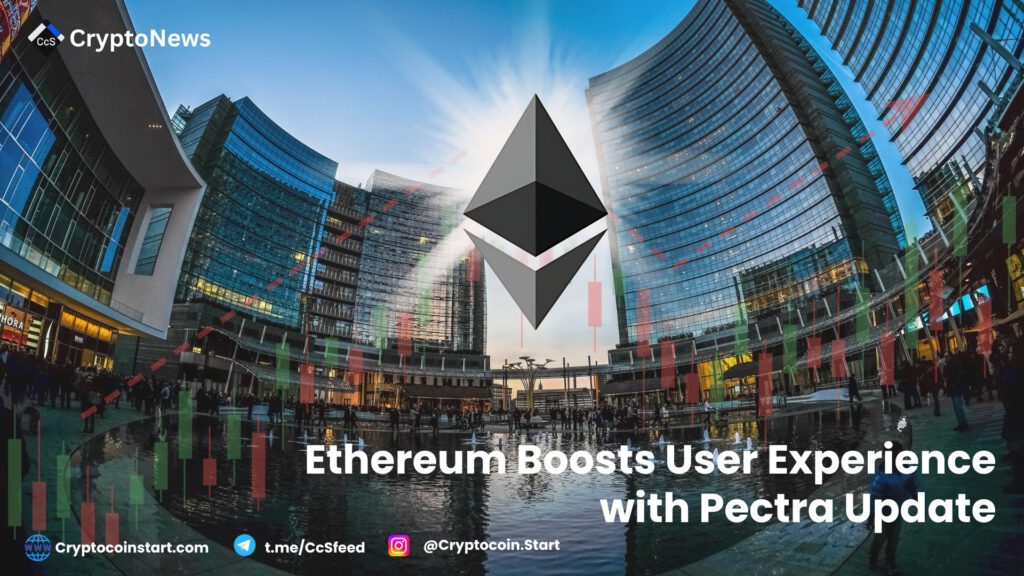
Pectra Update: A Major Upgrade for Ethereum’s Usability and Efficiency
The upcoming Pectra Update for Ethereum, scheduled for early 2025, promises to bring significant enhancements to the Ethereum network, particularly in terms of usability and transactional efficiency. A key component of this update is the introduction of the EIP-3074 standard, which allows for network fee sponsorship, enabling users to execute transactions without holding sufficient ether (ETH) in their accounts to cover gas fees.
This innovation addresses a common challenge for Ethereum users: the inability to process transactions when their wallets hold assets but lack the necessary funds to pay transaction fees. The update is expected to enhance the overall user experience, particularly for new cryptocurrency users and those participating in decentralized finance (DeFi) activities.
Understanding EIP-3074: Sponsoring Network Fees
The EIP-3074 standard, a central feature of the Pectra update, allows an external account to sponsor network fees. In simpler terms, if a user does not have enough ETH to cover transaction costs, another account can step in to pay those fees, allowing the transaction to proceed smoothly.
Currently, users facing this issue often need to transfer fiat currency to an exchange, convert it into ETH, and then send it to their private wallets before completing the transaction—a cumbersome and costly process. With EIP-3074, Ethereum will streamline this procedure by eliminating the need for users to hold ETH to initiate transactions, solving a frequent issue in the blockchain ecosystem.
This new feature is especially beneficial in scenarios like:
- Airdrops: Users often receive tokens in wallets that have no ETH, leaving them unable to transfer or use those assets.
- Novice Users: New cryptocurrency users who receive assets from friends or other sources but lack the ETH needed to pay for gas fees.
By enabling sponsored transactions, Ethereum lowers the barriers to entry and simplifies the user experience, making it more accessible for both new and experienced users alike.
EIP-7702: External Ownership Accounts as Temporary Smart Contracts
In addition to EIP-3074, the Pectra update introduces another groundbreaking standard: EIP-7702. Proposed by Ethereum co-founder Vitalik Buterin, this standard allows external ownership accounts (EOAs)—accounts controlled by private keys rather than smart contracts—to temporarily function as smart contracts for the purpose of processing transactions.
This temporary transformation of EOAs into smart contracts offers several advantages:
- Security: EOAs can perform advanced transactions without permanently granting control to a smart contract, reducing risks associated with long-term custody of digital assets.
- Efficiency: Users can execute complex transactions without needing a dedicated smart contract, minimizing operational overhead.
- Flexibility: After processing a transaction, the account reverts to its original state as an EOA, providing a seamless experience for users.
This functionality helps reduce the risk of smart contracts gaining excessive control over user wallets, while still allowing them to facilitate complex transactions when needed.
Pectra and the Evolution of Ethereum
The Pectra update builds on the momentum of previous updates to Ethereum, such as the Dencun update implemented in March 2024. The Dencun update focused on reducing gas fees by improving data management, making transactions on the Ethereum network more affordable and efficient. Pectra aims to take this a step further by addressing issues related to gas fees and staking, while also introducing new transaction capabilities.
Key improvements introduced by the Pectra update include:
- Enhanced Usability: The ability to sponsor gas fees significantly lowers the barrier to entry for users who may not have ETH in their wallets.
- Staking Enhancements: The update will allow a higher number of ETH to be staked—from 32 to 2048 ETH—reducing the need for frequent interactions with staking contracts and lowering operational costs for stakers.
- Improved Security: EIP-7702 introduces smart contract-like capabilities to EOAs without the risk of long-term custody, enhancing security for users.
Ethereum’s Price and Market Activity
At the time of writing, the price of Ethereum (ETH) is $2,561.95, reflecting a 4.74% increase in the last 24 hours. This price movement reflects renewed interest in Ethereum as it continues to innovate and provide solutions to some of the most persistent challenges within the blockchain space.
The circulating supply of Ethereum is currently around 120.35 million ETH, and the 24-hour trading volume stands at approximately $19.42 billion, showcasing the cryptocurrency’s active market presence.
Why the Pectra Update is a Game Changer for Ethereum
The Pectra update is poised to significantly improve the Ethereum network in several ways. By introducing EIP-3074 and EIP-7702, Ethereum addresses long-standing issues related to transaction fees and security, while also enhancing staking mechanisms. These changes make the Ethereum blockchain more user-friendly and accessible to both retail and institutional users.
The impact of this update will likely be felt across several key areas of the Ethereum ecosystem:
- DeFi: Simplified transactions will lower barriers to entry for decentralized finance users, enabling more efficient participation in lending, borrowing, and trading activities.
- NFTs: Users engaged in buying and selling non-fungible tokens (NFTs) will benefit from the reduced need to manage gas fees, making NFT trading more seamless.
- Staking: Higher staking limits will enable larger entities to participate in securing the network, improving Ethereum’s decentralization and security.
Conclusion: A Bright Future for Ethereum
The Pectra update represents a major step forward in Ethereum’s evolution. By addressing some of the network’s most pressing challenges, such as high transaction fees and security risks, this update paves the way for broader adoption and more efficient use of the Ethereum blockchain.
As Ethereum continues to innovate and improve its technology, the network is positioned to maintain its status as a leader in the cryptocurrency space, offering solutions that benefit users and developers alike.
Looking ahead, Ethereum’s commitment to continuous improvement with updates like Pectra will likely drive its long-term success, further solidifying its place as a cornerstone of the blockchain ecosystem.

